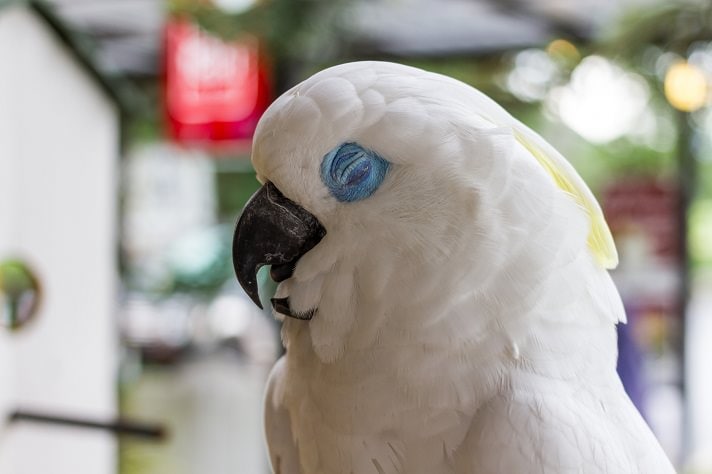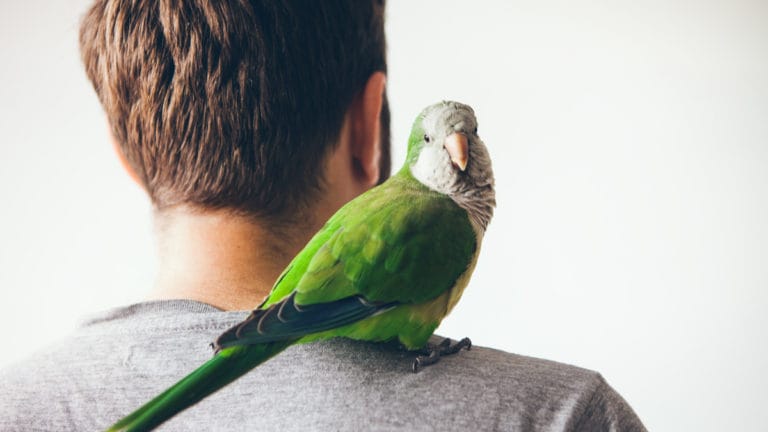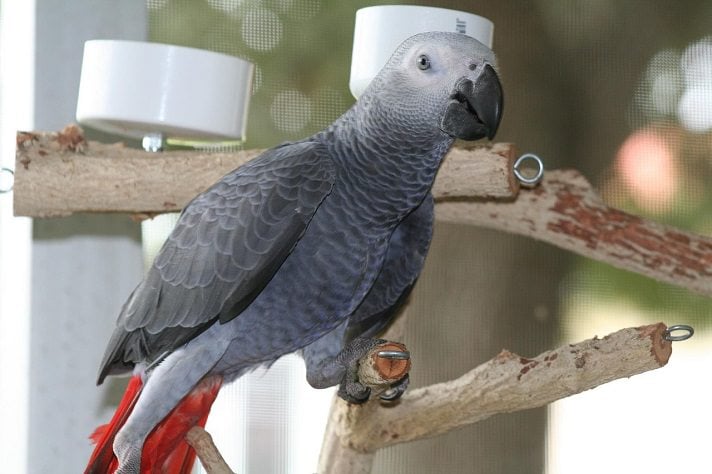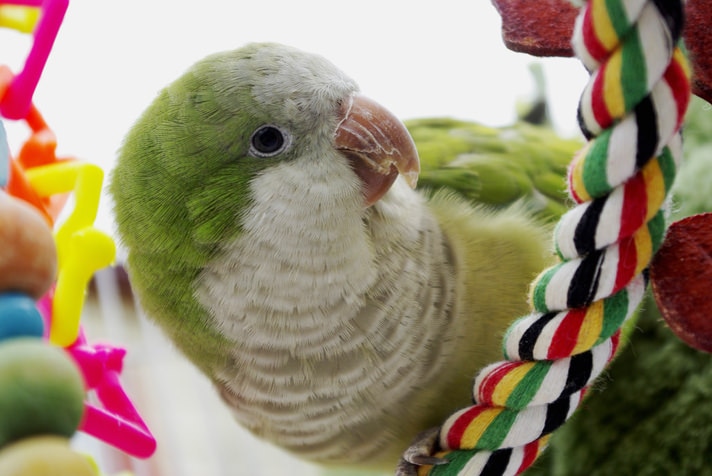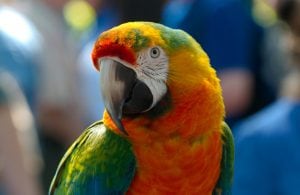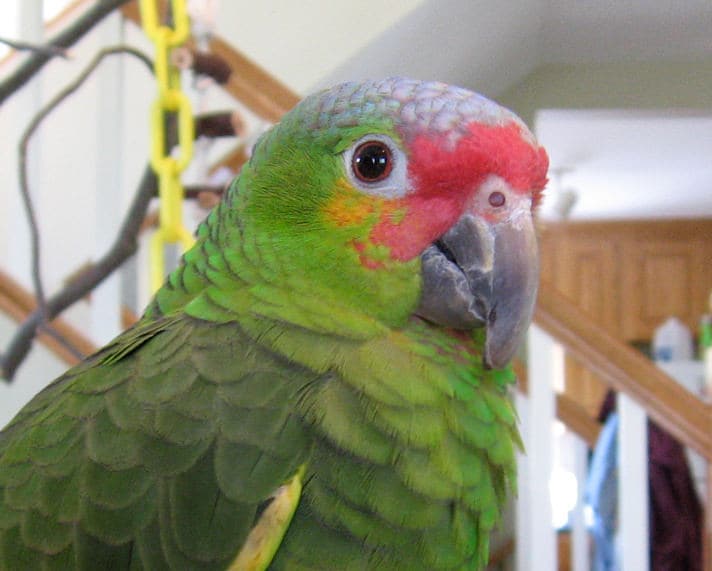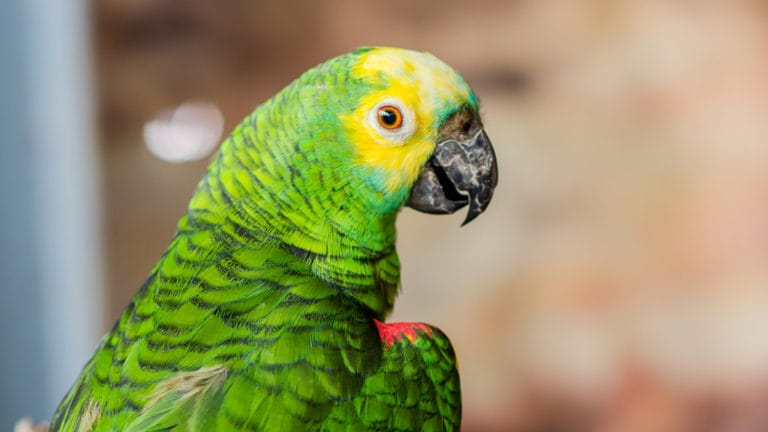Wild parrots do not question their bedtime. It arrives when the sun sets and night tucks them in. A full moon might extend a raucous flock’s social time for one night, and certainly the altering seasons in some regions inch the bedtime later or earlier gradually during the year, but when the sun disappears, most wild parrots say good night.
“Sleep patterns are influenced by sunlight availability; e.g. time of year, latitude,” said Toa Kyle, a biologist with the World Parrot Trust who has studied parrots in the field for the past decade, particularly the Buffon’s macaws (or great-green macaws) of Costa Rica and, more recently, some of the macaws, Amazon parrots and conures of Bolivia and Brazil.
“Both the areas in South America I work in are relatively close to the equator so sunlight tends to be around 11 to 13 hours per day.” Kyle says the parrots’ nighttime routines vary from species to species. Some parrots roost in large groups, others in pairs, and some, like golden conures, sleep in tree cavities even out of breeding season — but all, it seems, value their shuteye.
“Most of the species I’ve watched tend to arrive at roost sites half an hour to an hour before sunset,” Kyle said. “There is a lot of chatter among species, and pairs of [parrots] tend to fly off a given perch, circle the island a few times, then descend to a given perch again where they may resume preening or calling to other birds. This type of activity continues until around 10 to 15 minutes after sunset, after which things become very silent and, presumably, most birds in the roost are sleeping.”
Wild parrots do not question their bedtime. It arrives when the sun sets and night tucks them in. A full moon might extend a raucous flock’s social time for one night, and certainly the altering seasons in some regions inch the bedtime later or earlier gradually during the year, but when the sun disappears, most wild parrots say good night.
“Sleep patterns are influenced by sunlight availability; e.g. time of year, latitude,” said Toa Kyle, a biologist with the World Parrot Trust who has studied parrots in the field for the past decade, particularly the Buffon’s macaws (or great-green macaws) of Costa Rica and, more recently, some of the macaws, Amazon parrots and conures of Bolivia and Brazil. “Both the areas in South America I work in are relatively close to the equator so sunlight tends to be around 11 to 13 hours per day.”
Kyle says the parrots’ nighttime routines vary from species to species. Some parrots roost in large groups, others in pairs, and some, like golden conures, sleep in tree cavities even out of breeding season — but all, it seems, value their shuteye.
“Most of the species I’ve watched tend to arrive at roost sites half an hour to an hour before sunset,” Kyle said. “There is a lot of chatter among species, and pairs of [parrots] tend to fly off a given perch, circle the island a few times, then descend to a given perch again where they may resume preening or calling to other birds. This type of activity continues until around 10 to 15 minutes after sunset, after which things become very silent and, presumably, most birds in the roost are sleeping.”
Sleep For Parrots
The time a pet bird wakes, eats, socializes and, yes, sleeps, can vary greatly from household to household, which, according to several avian veterinarians and parrot behavioral consultants, might not be such a bad thing.
At the Parrot Education and Adoption Center (PEAC) in San Diego, all of the parrots “are tucked in by 8 p.m. every night and get their breakfast around 6:30 every morning,” said Bonnie Kenk, director of the avian group.
Jessie, a red-bellied parrot, insists that his owner, Terri Pakula, a director with the Long Island Parrot Society, adhere to a strict bedtime schedule.
“[He] will start to say ‘night-night’ around 6:30, even during the summer, when it is still light outside,” Pakula said. “When I tell him, ‘soon,’ he becomes more insistent and starts to demand it loudly until I finally respond.”
At the Stafford household in Southern California, the flock of 16 parrots — mostly macaws and cockatoos — get about 10 to 12 hours of sleep each night thanks to timers that automatically turn the lights in the bird room on and off each morning and evening. Two sets of track lights turn on at alternate times to simulate a gradual dawn and dusk, said Mark Stafford, president of Parrots International. “By having the first set of house lights turns off 20 minutes prior to sunset and the second set 10 minutes prior, the birds experience a natural gradual dimming of the lights,” he said. “As all the lights have turned off by 10 minutes prior, the birds actually experience the natural effect of sunset and dusk.”
Several other pet bird owners noted that they, too, use timers to keep their parrots on a regular day/night schedule. Peggy Duval, membership director for the Lineolated Parakeet Society, also adjusts her bird-room timers to correspond with a natural daylight schedule, even making amendments for daylight savings time “to keep the birds’ rhythm in tune with the rest of the real world.”
Lee Cole of Washington relies on automatic light timers to begin and end the day and soft night lights to soothe her cockatiels’ night frights. Although she sometimes spends late nights on her computer, Cole uses a plastic keyboard cover to muffle her typing. “They’ve all become very accustomed to this and … they even go off to their sleepy places on cue.”
Accommodating Sleeping Schedules In People And Parrots
With work and social schedules that keep many Americans going around the clock, it’s no surprise that pet bird owners often find themselves up well past their pets’ pre-prime time bedtimes.
Pat Wieneke of Wisconsin wrote that when she worked the late shift, returning home at 1 a.m., her hour or so of unwinding time in front of the TV turned into a special bonding opportunity with her Amazon. “Willow, my blue-fronted Amazon, would always talk back very quietly and ask to come out and sit on my shoulder, and we would sing — meaning she would hum some tune of her own, and I would quietly hum it back,” wrote Wieneke. “I could pet her and scratch her neck and around her beak and often we would doze off — all things I would say ‘Do not do’ — but it was a very special time for us both.”
Toodles, Wieneke’s blue-and-gold macaw, however, chose sleep over cuddles. “Toodles… was not willing to spend that night time with me,” Wieneke wrote. “She is a mid-morning bird,” choosing to rise at 10 a.m.
A self-described night-owl, Nikki Moustaki, author of “Parrots for Dummies,” said her pet birds have adapted to this schedule. “I turn out their lights at about midnight or so, and then the sun wakes them up, though I do have the blinds down,” she said. “They aren’t active or make any noise until I wake up, and then I turn on the TV and it’s squawking time.”
Moustaki’s birds, which include an African grey parrot, a Meyer’s parrot and two lovebirds, get about nine to 10 hours of quiet, dark time each night, she said.
“Birds are very adaptable, so as long as you don’t throw them off balance by giving them too little or too much light, they are fine,” Moustaki said. “I have had these birds for a long time, and they are all healthy, friendly and fine.”
Some avian veterinarians and parrot behavioral consultants would agree with this sentiment.
Mattie Sue Athan, a parrot behavioral consultant and author of “A Guide to a Well-Behaved Parrot,” said that getting enough sleep is vital to a pet bird’s well-being and immune system. Adequate sleep or quiet time can also help reduce negative behaviors, such as nippiness and excessive screaming, but, she said, “I think people rearranging their lives to adjust to birds is not a good idea. It won’t last long. I’m not going to tell people not to stay up watching TV.”
Athan, therefore, recommends that people come up with a schedule that suits both the person’s schedules and an individual pet bird’s temperament. “I really believe it’s for the benefit of humans that birds get enough sleep,” she said. “If we get them up early and keep them up late, they will insist that we join them.”
According to Liz Wilson, CVT, CPBC and founder of the parrot division of the International Association of Animal Behavior Consultants, the key to maintaining a good relationship with your bird, one that will last a lifetime, is making compromises. When it comes to sleep, Wilson said it’s not fair to ask people to turn off TVs and tiptoe around a sleeping pet bird before they turn in for the night.
In fact, walking past a covered cage, no matter how quietly, could keep the pet bird awake anyway, Wilson said. “When people sneak through the house, you could be perceived as a predator,” she said. “You cannot sneak up on a sleeping bird… Their hearing is much better than ours.”
And dealing with a cranky pet bird isn’t fun either. “How do you feel when you don’t have enough sleep?” Wilson often asks her clients.
She suspects that most pet birds receive much less sleep than we expect they do. “If someone covers the cage at 8 p.m., then the teenager watches TV until 2 a.m., and Dad gets up at 6 am, that bird is only getting four hours of sleep,” Wilson said. “I bite when I only have four hours of sleep.”
Instead, Wilson recommends placing the pet bird in a smaller cage, such as a travel or boarding cage, also called a sleep cage, in a darkened room where no human will enter or exit during the night. “They really do want more sleep than most of us allow them,” Wilson said.
Sleep’s Health Benefits For Parrots
Lack of sleep in people has been blamed on everything from weight gain to memory loss to cardiovascular health deterioration. A recent study by researchers at Northwestern University found that animals, too, might suffer from one too many sleepless nights.
“We now know that chronic lack of sleep has an effect on how an animal sleeps,” said Fred Turek, professor of neurobiology and physiology and director of Northwestern’s Center for Sleep and Circadian Biology and an author of the study.
“The animals are getting by on less sleep, but they do not try to catch up. The ability to compensate for lost sleep is itself lost, which is damaging both physically and mentally.”
Although no formal study exists to measure pet-bird sleep needs, avian veterinarians say they know sleep affects their clients’ health. “Birds do not function physiology as well with a lack of sleep,” said Laurie Hess, DVM, ABVP – Avian Practice, in New York. “Sleep gives the body time to restore energy, to regenerate cells.”
“I’ve seen a lot of birds whose overall health improved when getting better sleep,” said Fern Van Sant, DVM, of the For the Birds avian-only clinic in San Jose, California. Van Sant believes bird owners should look closer at what their pets’ life would be like in its native environment. “The health of the bird is typically so much better when we look at where they come from, where they live, and we try to use some of those tools to enhance their lives or sense of well-being,” she said. “I think that it’s very, very, important to restore most of these birds to a normal photo period.”
Stick To A Schedule For Parrots
Getting birds’ day-night schedules on a consistent schedule is more important than the amount of sleep they receive, Van Sant said. Whether you can give your birds nine or 12 hours of sleep each night, make sure it’s the same each night. If a bird gets eight hours one night, 12 another and 10 the following, its bio-rhythms will “get out of whack,” setting it up for behavioral and health problems, according to Van Sant.
If you can’t make it to that gold standard of 12 hours of darkness for your bird each night of the week, stick to a goal you can meet each day, such as 10 hours of darkness, she said. “Consistency really seems to be the big factor.”
Hess, too, says establishing a routine promotes positive health in pet birds. “I’m a big a proponent of routines in general for birds,” she said.
Of course, you have to maintain some amount of flexibility, Hess said. However, when a bird has a predictable amount of time in the cage, a predictable amount of time to socialize, predictable hours out of the cage and a consistent bedtime, it knows what is expected of it and when, she said. “When you throw that off, it can upset the whole scheme of things.”
Hess said pet birds’ lives shouldn’t necessarily mirror their wild cousins. “Birds are more adaptable in our environments than we give them credit for.”
Splitting her time between several area animal hospitals means Hess doesn’t get home until 8 or 9 p.m. each night, eating her dinner even later at 10 pm. “My bird is up more at night because I’m up at night,” she said. “I’m sure that what birds do in captivity is different than what they do in the wild.”
Providing birds with quiet time to sleep could mean getting them up later in the morning or a nap during the day while everyone is away at work and the house is still, Hess suggested.
Wilson, too, recommends setting up sufficient time to socialize with birds while still giving them enough sleep.
“If the humans work late, making interaction time with the bird later at night, they can set it up so the bird gets up later in morning after they’ve already left for work,” she said. “Set it up so the lights and the radio come on in the bird’s shade-darkened room at, say, 10 a.m., then the bird is getting up maybe four hours later than you do, so it can stay up later to socialize.”
Both Athan and Wilson say sleep is just one component that affects a bird’s behavior, and it falls below diet and enrichment activities.
“When I’m dealing with a behavioral problem, I’m going to bring out all the big guns — nutrition, sleep, etc.,” Athan said. “I think the sleep issues is way overblown… I’m more likely to manipulate diet and rainfall.”
Wilson concurred. “The most important thing is diet.” Next for Wilson is cage size, socializing and toys.
Van Sant and Hess also see sleep as one of many factors affecting a bird’s overall health. It can affect everything from obesity to chronic egg-laying, said Van Sant, but so can a lot of other problems. “It’s one of the threads that would help promote normal physiology and overall health.”
All of those interviewed, however, seem to agree that good, consistent sleep can improve you and your bird’s life. “To have not only good health but also good behavioral health, they have to be well-rested,” said Athan.
Although the standard adage goes that humans require about eight hours of sleep each night, we all know someone who zips through the day on a mere six hours of shuteye and another who shouldn’t be approached on less than a solid nine hours of sleep. Just as sleep needs vary from person to person, avian behavioral consultants and veterinarians find it varies for birds, too, although there are some general guidelines to follow.
“Equatorial birds need 12 hours of daylight, 12 hours of night,” said Fern Van Sant, DVM, of For the Birds avian clinic in San Jose, California. “The Australian and Indonesia birds are from so far south of the equator, they are geared toward changing cycles. Cockatiels and budgies adapted to a photo period much like [that of] California’s, with tremendous variation depending on season. The birds we see as more resilient are conures, Amazons and macaws. It doesn’t seem to make a huge difference for them.”
“Parrots, of course, are very divergent species, so it depends on individual bird,” added Liz Wilson, CVT, CPBC.
Laurie Hess, DVM, ABVP — Avian Practice, in New York echoes that sentiment. “I think how much sleep for the bird is very individual. It depends a lot on the individual.”
So how do you know if your bird is getting enough sleep?
“You can look for birds being over-stimulated, being cranky,” Hess said.
Avian behavioral consultant Mattie Sue Athan said, “I would look for excess vocalizations and nippiness.”
Although she has “seen a number of behavioral problems disappear after the bird simply gets enough sleep,” Wilson cautioned against making changes to bird’s sleep schedule without just cause.
“If somebody doesn’t have a problem, if their parrot is just happy and great to get along with, they shouldn’t change anything,” she said.
Napping may or may not be a clue into your pet bird’s sleep needs. “They’re all going to nap in the afternoon,” Wilson said. Instead, look for a more subtle change. “The bird could be very crabby; maybe biting in the evening to let you know it wants to go to bed,” said Wilson.
Excess napping might actually mean your bird is bored, said Van Sant. “I think they nap a good deal when they don’t have anything else to do.” Van Sant suggests adding new foraging activities and daily wing flapping exercises to benefit your bird mentally and to also tucker it out for bedtime.
By: Rose Gordon
Featured Image: Via onsuda/iStock/Thinkstock
Share:
